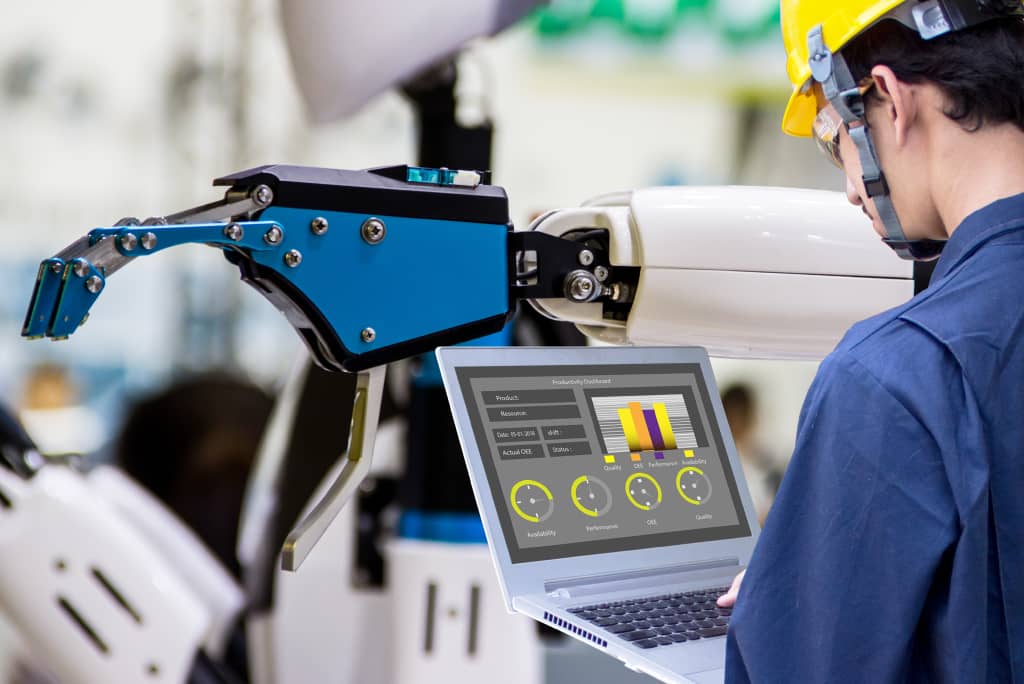RECENT POSTS

Demystifying Rockwell Automation Integrators: A Guide by PBE Industry Experts
Rockwell Automation is one of the top industrial automation companies in the USA and a major supplier worldwide. Its offerings empower customers across manufacturing and other industries to streamline processes and boost productivity. A key element of Rockwell’s integrated systems is their programmable logic controller (PLC), which enables precise and flexible control over operations.
Allen-Bradley, a leading brand for automation components, was acquired by Rockwell more than 30 years ago and remains an integral part of Rockwell’s product portfolio. Understanding PLCs and Allen-Bradley products is essential for any organization considering or already leveraging Rockwell Automation technologies.
This article serves as a guide to demystify these solutions and work effectively with certified Rockwell Automation integrators who specialize in implementation and support services. The key topics covered include:
- An overview of ControlLogix, CompactLogix, and Micro800 PLCs
- The history and capabilities of Allen-Bradley motors, drives, and relays
- The benefits of Rockwell’s Integrated Architecture
- Selection criteria for Rockwell Automation system integrators.
Rockwell Automation PLC
Programmable logic controllers are rugged industrial computer control systems that continuously monitor inputs from sensors or human operators and use this data to control machines or processes via digitally programmable logic. Rockwell Automation provides a robust PLC offering with their Allen-Bradley ControlLogix, CompactLogix, and Micro800 models, which deliver precise solutions, scaling from basic machine automation to the most complex processes.
ControlLogix
ControlLogix offers modular, enterprise-level capabilities on the Logix control platform. Purpose-built controllers feature high-performance processors, ample memory, and speed for complex machine control and information management. Modular I/O chassis and thousands of compatible I/O modules can be integrated over EtherNet/IP or ControlNet.
Redundancy modules enhance reliability for critical processes. As an integrated PlantPAx system, ControlLogix can interface with enterprise, MES, and SCADA systems. It meets demanding requirements across industries from automotive to oil and gas.
CompactLogix
The CompactLogix system provides a compact, integrated PLC ideal for small-to-mid-sized automation tasks. Its processors, power supplies, and discrete and analog I/Os are housed in a single chassis, taking up minimal cabinet space. It leverages the same Logix control engine as ControlLogix for programming simplicity across hardware platforms.
Built-in EtherNet/IP ports allow for distributed I/O over a plant network. CompactLogix is a cost-effective solution for applications including packaging, bottling, and material handling.
Micro800 PLCs
The Micro800 PLCs are entry-level controllers requiring no previous PLC programming experience. Available as a standalone brick mounting base unit or plug-in module, Micro800 adapts to any small machine design. Despite the micro size, Micro800 offers processing speeds, math abilities, and connectivity that rivals larger PLCs.
Embedded I/Os minimize wiring. Easy-to-use Connected Components Workbench software lets users set up in minutes. Expandability options include expansion I/O, communication, productivity, and safety modules. The flexible, affordable Micro800 works well for basic control tasks.
All Rockwell PLCs interface seamlessly with other Rockwell software and devices through tag-based programming on the Studio 5000 Logix Designer application. This enables the unified development of controllers, visualization interfaces, motion control, and more on a consolidated platform.
Allen-Bradley by Rockwell Automation
For more than 100 years, Allen-Bradley has produced leading components for industrial automation as a major enterprise brand. Even before Allen-Bradley’s acquisition by Rockwell in 1985, the two companies maintained close ties in drive systems and controllers for decades. Today, Rockwell has greatly expanded Allen-Bradley’s offerings through significant investment in technology.
Core Allen-Bradley products include motors, motor control centers, relays, timers, push buttons, limit switches, sensors, power supplies, panel displays, and wiring components. The company’s lines of motors and mechanical devices feature rugged designs to withstand harsh environmental conditions, from dust to vibration. Product families of relays, contactors, push buttons, pilot lights, and timers provide control and indication. Allen-Bradley also offers various safety components, power supplies, panel displays, and interfaces.
Across these products, Allen-Bradley emphasizes quality, reliability, and integration while maintaining seamless compatibility with Rockwell software, like Studio5000 Logix Designer. Through the unified Allen-Bradley brand, Rockwell delivers comprehensive component solutions along with its complete automation systems.
Rockwell Automation Integrated Architecture Builder
Rockwell Automation provides a holistic system for industrial automation called Integrated Architecture. The system unites all levels of an operation, from sensors and machines up through control systems, networks, analytics software, and business systems. An Integrated Architecture system facilitates a seamless flow of information to optimize productivity. Rockwell’s Architecture Builder tools speed up the configuration and maintenance of these unified systems.
Integrated Architecture Builder Basics
Integrated Architecture refers to Rockwell Automation’s framework for the convergence of plant-floor control systems with network and information software and services. This allows the collection and visibility of data from disparate sources within one system for informed decision-making. The Architecture Builder tools, including FactoryTalk View Studio and Studio 5000 Logix Designer, enable the intuitive, rapid set-up of this unified architecture.
Key Tools and Components
Key components of the Rockwell Automation Integrated Architecture Builder include:
FactoryTalk Network
FactoryTalk Network Manager delivers comprehensive monitoring and diagnostics for EtherNet/IP networks supporting ControlLogix, CompactLogix, and other Logix controllers. It provides a central point to view communication status, gather troubleshooting data, check device properties, and receive alerts on any network disruption that could impact productivity. Proper network management is essential for Integrated Architecture.
Stratix Ethernet Switches
Stratix industrial Ethernet switches from Rockwell Automation provide reliable, managed connectivity for Integrated Architectures. Stratix switches come pre-configured out-of-the-box for seamless deployment. They feature robust metal housings to withstand harsh environments and offer redundancy capabilities to maximize uptime. Built-in security features prevent unauthorized access and cyber intrusions. Stratix works intelligently with Logix controllers and FactoryTalk software for smarter network control.
Software and Services
Other Architecture Builder tools include FactoryTalk software applications like View Studio HMI configuration, Historian for centralized data logging, VantagePoint EMI analytics, and Performance Monitor. Combined with Rockwell’s Lifecycle Services team for implementation assistance, these tools provide a solid foundation for automation.
Benefits of Rockwell Automation Integrated Architecture Builder
The greatest advantage of Rockwell Automation’s Integrated Architecture is that it breaks down barriers between operational disciplines for improved performance. Uniting systems and data on a common platform allows for quickly mirroring the real world into the information world.
Operators gain better visibility to act before small issues become problems, while management can spot trends to guide impactful business decisions, and technicians gain greater troubleshooting insights. An integrated architecture means working smarter, not harder, across the board.
How to Choose Rockwell Automation Systems Integrators
Implementing sophisticated Rockwell Automation solutions like Integrated Architecture requires assistance from qualified integrators with specialized expertise. Choosing the right integration partner is crucial for maximizing value from investments in Rockwell technology.
Importance of Experienced Integrators
Industrial automation deployments involve complex hardware, software, and service components. An experienced Rockwell integrator combines domain expertise with technical competence for smooth implementation. They augment a manufacturer’s workforce to properly install, configure, program, test, and commission Rockwell systems.
Selecting an integrator with proven success supporting Rockwell Automation and Allen-Bradley solutions in your industry helps mitigate project risks and timelines. The integrator’s familiarity with available options ensures an optimal, scalable architecture.
Rockwell Automation Certification Tiers
To validate integration proficiency on Rockwell systems, the company offers credentialing through its partner program. Certification rankings, awarded based on completion of sales, service, and support requirements, designate an integrator’s capability level.
Endorsed Integrator is the entry-level tier, indicating basic infrastructure and expertise. Next, Recognized Integrators meet additional thresholds related to completed projects and personnel competencies. The highest level, Designated Integrator, represents extensive real-world experience with complex Rockwell implementations.
Choose integrators with credentials aligning with your implementation needs.
Choosing the Right Integrator
Essential criteria for evaluating prospective Rockwell Automation integrators include:
Industry Experience
Priority should go to integrators with substantial expertise in your vertical. An integrator versed in automotive manufacturing will better realize operational nuances than a generalist. Review case studies and Rockwell validations focused on your industry.
Staff Training and Retention
Examine the background of the integrator’s leadership team, engineers, and technicians who will support solutions. Ensure ongoing Rockwell Automation training investment for the latest product developments and features. Check employee retention rates, too; longer-tenured staff signal stability.
Services Portfolio
Leading integrators provide extensive services beyond core integration, like assessments, upgrades/migrations, managed services, cybersecurity, and operator training. Having support for the technology lifecycle brings value over the long term.
Certification Level
Confirm that the partner maintains the highest-tier Rockwell credentials that match the complexity of your specific automation goals.
Cultural Fit
Softer criteria around responsiveness, transparency, and collaboration matter, as well, in choosing an automation ally. Visit integrator offices if possible to meet leadership and get a feel for their commitment to customers.
Benefits of Leveraging Certified Integrators
Partnering with a Rockwell-validated integration expert for Allen-Bradley product implementation, support, and lifecycle management delivers a multifaceted upside beyond fulfilling technical needs cost-effectively.
Certified integrators give adopters confidence in their solutions via proven methodologies, risk mitigation, and selective use of finest-fit architectures. They maximize operational gains from Rockwell system investments through ongoing optimization. Their independent guidance helps organizations stay ahead of changing industry dynamics. Ultimately, by augmenting expertise and capacity, certified integrators give end-users peace of mind.
Partner With Industry Leading Rockwell Automation System Integrators
When undertaking complex Rockwell Automation integration projects, leverage the expertise of leading solutions providers like Pacific Blue Engineering. With more than 15 years specializing in industrial controls, Pacific Blue Engineering offers proven methodologies and deep Rockwell expertise to accelerate success.
A comprehensive integration approach typically involves:
- Thoroughly assessing environments and business objectives
- Strategically planning optimal system architectures
- Flawlessly executing the physical installation and cutover
- Completely testing and validating configurations
- Providing operational training to users
- Delivering ongoing maintenance and optimization services
Pacific Blue Engineering handles the heavy lifting across the entire project lifecycle. This alleviates the IT burden on your teams, mitigates implementation disruptions, and ensures continuity of institutional knowledge around the new workflows. Their involvement as a trusted ally de-risks deployments to realize more value from investments into integrated controls.
With extensive Rockwell Automation and Allen-Bradley experience across industries, Pacific Blue Engineering strives to maximize safety, quality, and process improvements. Their solutions integration support empowers manufacturers to enhance productivity, boost efficiency, and work smarter.
Frequently Asked Questions (FAQs)
What is Rockwell Automation known for?
Rockwell Automation is one of the world’s largest providers of industrial automation solutions and information technology. They are known for their market-leading Allen-Bradley brand PLCs (programmable logic controllers), drives, motion control, relays, motors, HMIs (human-machine interfaces), and integrated software/networking for industrial control and information. Rockwell aims to make its customers more productive and the world more sustainable through industrial automation innovation.
What is Rockwell software used for?
Rockwell Automation provides software suites used across industrial settings for the configuration, operation, integration, analytics, and visualization of automated processes. Key software applications include Studio 5000 for PLC programming, FactoryTalk site edition for HMI and SCADA, FactoryTalk analytics for industrial big data, and FactoryTalk AssetCentre for monitoring assets. The solutions provide a digital thread connecting devices, networks, systems, and insights across the Industrial Internet of Things (IIoT).
Is Rockwell Automation a good company?
Rockwell Automation has built a reputation over 100+ years as an excellent industrial automation and information company through its product quality, technical innovation, and focus on customer needs. Rockwell maintains strong financial performance as a Fortune 500 company and market leadership in programmable controllers, servos, and drives. They invest heavily in R&D and their partner ecosystem for next-gen solutions like smart manufacturing, connected enterprises, and augmented workforce advancements.
What software does Allen-Bradley use for PLC?
As part of Rockwell Automation, Allen-Bradley programmable logic controllers (PLCs) use Rockwell’s Studio 5000 Logix Designer software for PLC programming, visualization, and control networking. Studio 5000 offers a unified platform for configuring Allen-Bradley ControlLogix, CompactLogix, and Micro800 series PLCs using common tag-based programming architecture across the hardware portfolio. RSEmotion software can additionally be used for multi-axis motion control programming.
What is an example of an automation company?
Rockwell Automation serves as a leading example of an industrial automation company. Other notable companies following the Rockwell Automation model of providing end-to-end platforms to integrate plant processes, machinery, discrete assets, and higher-level IT networks include:
- Siemens with their Simatic automation suite
- Schneider Electric and their EcoStruxure control solutions
- Emerson and their Plantweb digital ecosystem
- ABB with Ability based automation technologies
If you are looking for Rockwell Automation Systems Integrators, contact the certified controls engineering team at Pacific Blue Engineering. Call (657) 201-8603 or request a consultation online.
similar posts
Certifications
Contact Us
Telephone:
Corporate Office “The Shop”
Pacific Blue Engineering, LLC
2880 Orange Ave
Long Beach, CA 90755
© All contents copyright © 2023 by Pacific Blue Engineering













